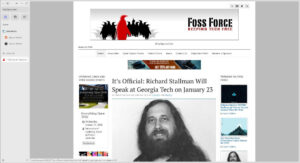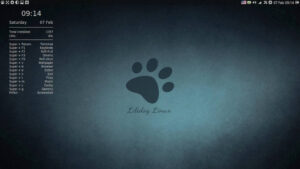Now that Thunderbird is back in the Debian repositories, the decade long dispute that led to all Mozilla products in Debian being rebranded has ended.
![]()
The hatchet is finally completely buried. Iceweasel was laid to rest a year ago with the return of Firefox to Debian. Now, Icedove gets to go gently into that good night as well, as the Thunderbird email client returns to Debian.
It’s hard to believe that over a half-generation has passed since this whole brouhaha started. It’s even more difficult to believe it took so long to bring it to an amicable conclusion. It’s sad it even happened in the first place. This is the type of argument that’s not supposed to happen in the FOSS community, especially back in the century’s early days when Microsoft was everywhere trying to crush both Linux and browsers competing with Internet Explorer.
Although Iceweasel didn’t come into existence until 2006, the story actually began in 2005. This was about a year after Mozilla released Firefox as a standalone browser drop-in for its then flagship product, the Mozilla Application Suite, which was partially based on the source code of Netscape Communicator, the dominant browser for much of the 1990s.
Like Netscape, Mozilla was more than just a browser and contained a full suite of Internet tools, most carrying names held over from its Netscape incarnation. The browser was Navigator, with Communicator as the mail and newsgroup client. There was also a WYSIWYG HTML developer, Composer, and ChatZilla, an IRC client. The suite also contained an address book and could sync with the Palm Pilot, a handheld PIM which was all the rage until the Blackberry came along.
The problems between Mozilla and Debian started over the cute little Firefox logo, which was copyrighted under terms that didn’t fit Debian’s free software guidelines, the DFSG. The solution to this conundrum seemed simple: Debian simply shipped Firefox without the logo. This worked until May, 2006, when Mike Conner, who was then Firefox’s lead developer, revoked Debian’s right to use the Firefox name.
“Firefox (the name) is equally protected and controlled by the same trademark policy and legal requirements as the Firefox logo. You’re free to use any other name for the browser bits, but calling the browser Firefox requires the same approvals as are required for using the logo and other artwork.”
Going forward, Conner said, in order to use the Firefox brand, all Debian patches would need to be approved by Mozilla.
Almost immediately, this led to the rebranding of all Mozilla products in Debian, with Firefox becoming Iceweasel, Thunderbird becoming Icedove, Sunbird becoming Iceowl and SeaMonkey becoming Iceape.
That’s all history now. A year after Firefox’s return to Debian, on February 15 Debian developer Christoph Goehre announcemed that Thunderbird and its integrated calendar app, Lightning, had been returned to the repository under their “real” names:
“Thunderbird is back in Debian! We also renamed other related packages to use official names, e.g. iceowl-extension -> lightning.
“For now, we need testers to catch existing issues and things we haven’t seen until now.”
What happened to end this cold war of sorts that had been going on for more than a decade? A little level headed thinking on both sides of the fence. Mozilla decided the Debian didn’t need to jump through hoops to get its patches approved in order to use the Firefox name (“Mozilla recognizes that patches applied to Iceweasel/Firefox don’t impact the quality of the product.”), and Debian decided that it no longer has a problem with the Firefox logo (“The Firefox logo was released under a free copyright license which matches the DFSG.”).
As Debian dropped support for Iceape/SeaMonkey in 2013, this brings to an end a bit of Linux history which never should have happened.
Christine Hall has been a journalist since 1971. In 2001, she began writing a weekly consumer computer column and started covering Linux and FOSS in 2002 after making the switch to GNU/Linux. Follow her on Twitter: @BrideOfLinux











Basically, Mozilla came to their senses. Debian didn’t change their policies, which is a good thing.
They are one of the few distros that really gets the need to split FOSS from proprietary software. Arch could learn a lesson or two from Debian.
“The problems between Mozilla and Debian started over the cute little Firefox logo, which was copyrighted under terms that didn’t fit Debian’s free software guidelines, the DFSG.”
Could you elaborate on this? Logos are generally trademarked, not copyrighted, but I suppose they can be both…
The logos are trademarked, but additionally the image files were distributed with a non-free license.
Mozilla also had a bizarre requirement that people modifying the Firefox branded package must request permission from Mozilla before doing so. That violates the DFSG. Debian also rejected the idea of obtaining an exception from Mozilla for themselves because that would also violate the DFSG (those rights wouldn’t transfer to Debian’s users.)
So they decided to strip out the logo and branding covered by Mozilla’s trademark poilicy and created IceWeasel. Not an actual fork of the code like GNU IceCat (confusingly also called IceWeasel at one time), but a slightly modified package that gave Debian to flexibility to add their own patches.
@Mike Actually, the logo art is registered as a trademark, but is also covered under a copyright, and it was the copyright that was at issue with Debian.
From Mozilla Corporation’s branding page:
“The logo files containing our trademarks are available under the following copyright licenses: vector logo files under CC-BY 3.0 or later; bitmap logo files under MPL 2.”
@Christine
I think you meant to reply to Thad? I know the image files are/were covered under copyright.
The copyright issue in question that caused a conflict with Debian is NOT caused by the licenses you list. The artwork files were previously covered by a non-FOSS license which is why Debian had a problem with them. The license prevented modification. The current licenses are FOSS and thus acceptable to Debian.
Thanks for the explanation.
@Mike Those are the current licenses, not the licenses that were in effect in 2005. I just used them to illustrate that trademark art can still be covered by copyrights.
@Christine
I thought so. Just trying to be clear. 🙂
The best thing about Firefox is that you can no longer use Tools->Page Info to download videos and music from a page.
Losing freedom is wonderful.
I remember when this happened. Agreed, it should never have happened in the first place. Glad to see things are now back as they should’ve been.
> “Agreed, it should never have happened in the first place.”
I do agree it shouldn’t have happened. Mozilla should not have adopted such an anti-FOSS policy since it runs counter to their stated goals.
However given that they did, Debian’s creation of IceWeasel was exactly the right solution to ensure freedom for their users.
FINALLY!…..my favorite browser and one of the “Founding Fathers” of Linux Distros are back together! Think I’ll celebrate by installing the latest version of Debian on my small Dell desktop PC with a 500GB HDD and 16GB of RAM. This is great news indeed. No offense but I never could understand the whole controversy….thanks for explaining it so that I can understand it Christine!
Now if someone could just make a T-Shirt with both of their logos emblazoned on it….LoL!